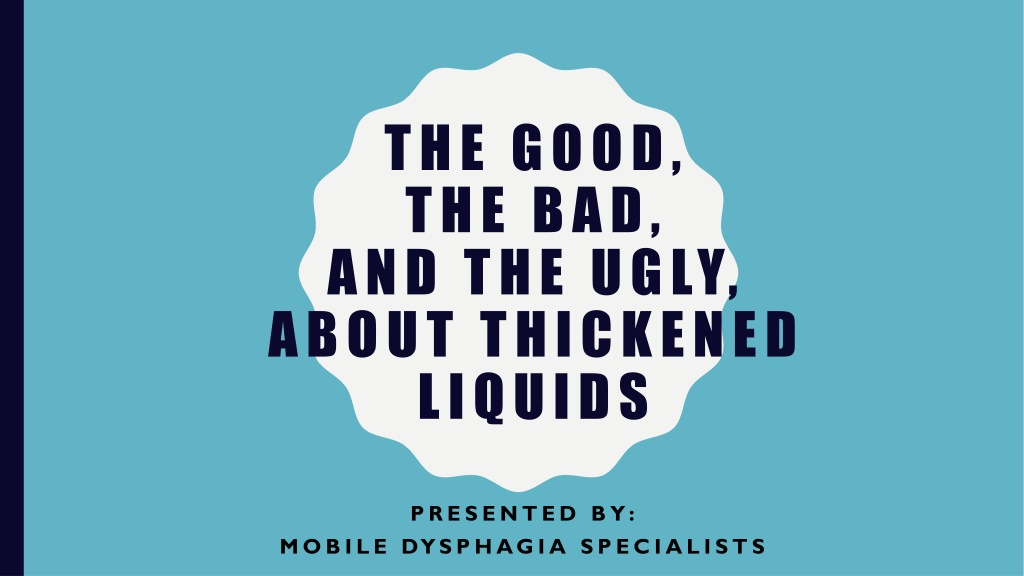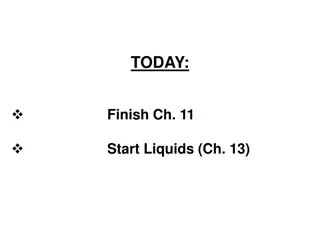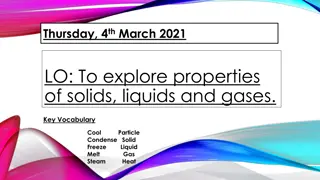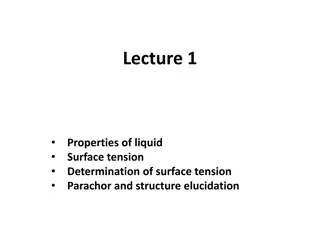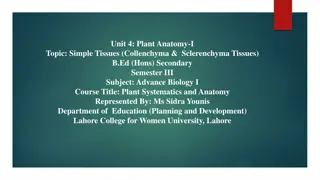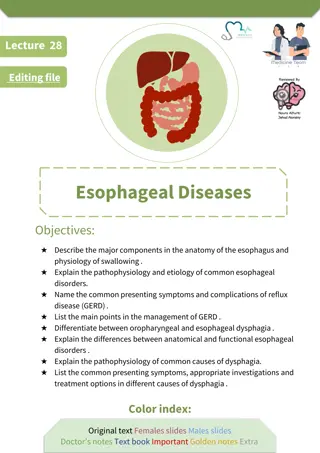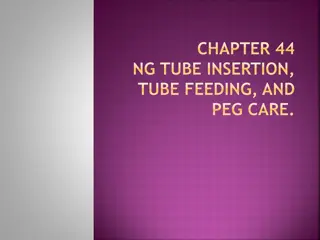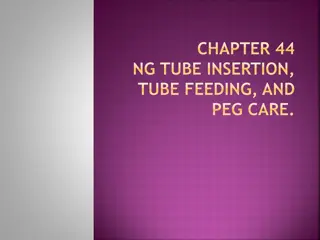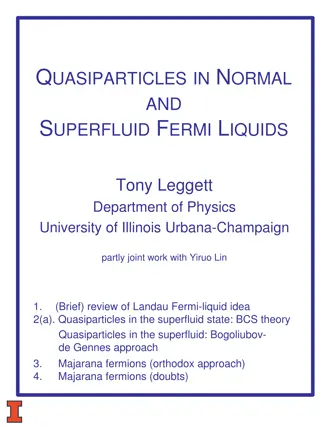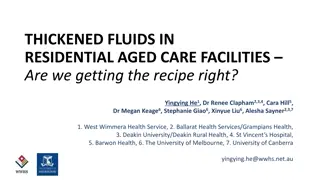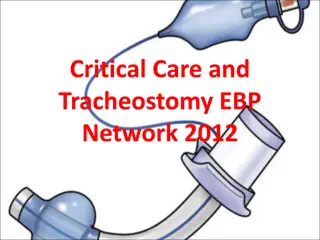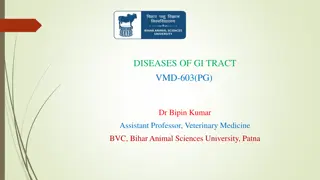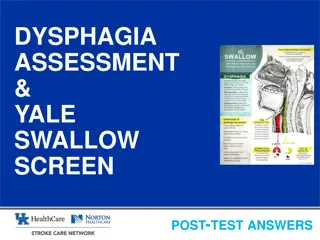Understanding Thickened Liquids in Dysphagia Management
Thickened liquids are often recommended for residents with swallowing difficulties to prevent aspiration pneumonia. Recommendations are typically made by speech pathologists, with nursing sometimes adjusting based on availability of therapy. Aspiration pneumonia occurs when substances are inhaled into the lungs, increasing the risk for respiratory issues. Residents on thickened liquids need careful monitoring. Different protocols like MBSS and FEES are followed based on location.
Download Presentation

Please find below an Image/Link to download the presentation.
The content on the website is provided AS IS for your information and personal use only. It may not be sold, licensed, or shared on other websites without obtaining consent from the author. Download presentation by click this link. If you encounter any issues during the download, it is possible that the publisher has removed the file from their server.
E N D
Presentation Transcript
THE GOOD, THE BAD, AND THE UGLY, ABOUT THICKENED LIQUIDS PRESENTED BY: MOBILE DYSPHAGIA SPECIALISTS
Why would a resident be on thickened liquids? Resident has difficulty managing liquids due to a weak or in-coordinated tongue or a swallow reflex delay
Who makes the recommendations for thickened liquids? Typically the speech pathologist, but nursing will sometimes downgrade a residents liquids when they are having difficulty swallowing and speech therapy is not available.
# 1 GOAL OF THE SPEECH PATHOLOGIST WHEN TREATING A SWALLOWING DISORDER . Prevent Aspiration Pneumonia
ASPIRATION PNEUMONIA Aspiration pneumonia occurs when food, saliva, liquids,or vomit is breathed into the lungs instead of being swallowed into the esophagus and stomach Bacteria causes pneumonia, not the food, liquid, or saliva. Even when we prescribe thickened liquids, the patient will still be aspirating their own secretions.
ASPIRATION PNEUMONIA (CONT) We all aspirate from time to time When talking and eating During sleep Most people can tolerate some aspiration without getting aspiration pneumonia Those at higher risk include: Asthmatics, residents with COPD, Parkinson s and other respiratory disorders that would impede the residents ability to clear secretions One of the top 5 diagnosis for hospital readmissions
WHAT DOES ASPIRATION LOOK LIKE? MBSS video of aspiration
1 OUT OF 12 NURSING HOME RESIDENTS ARE ON THICKENED LIQUIDS
WHY SO MANY RESIDENTS ON THICKENED LIQUIDS? Clinicians who have gone to school in the Midwest have been taught that the MBSS is the gold standard Dr. Jerry Logemann, from Northwestern University , a clinician and researcher created the MBSS protocol. Clinicians on the East and West coast are taught the FEES method as the gold standard in swallowing diagnostics. The creator of the FEES protocol, Dr. Langford is from Boston Hospital.
WHY SO MANY THICKENED LIQUIDS? (CONT) Traditionally, speech pathologists had to make very conservative diet recommendations due to the limitations of the swallow evaluations available to us. Bedside Swallow Evaluation (BSSE) Modified Barium Swallow Study (MBSS) Residents are not being re-evaluated once they are put on a modified diet in the hospital. Reassessments are not completed due to resident being d/c
WHY SO MANY THICKENED LIQUIDS (CONT)? Too difficult to send residents out to the hospital for swallowing re- assessments Too difficult physically and or mentally Too costly to send resident out for swallow re-assessment Residents fall through the cracks. They ve always been on that diet A resident on thickened liquids should receiving swallow therapy
Types of Thickened Liquids THICKENED LIQUID TYPES Nectar Thick Honey Thick Pudding Thick
SIDE EFFECTS OF THICKENED LIQUIDS
SIDE EFFECTS OF THICKENED LIQUIDS DEHYDRATION Tastes awful . Feels like swallowing a raw egg Residents wont drink the thickened liquid OR drink very little Residents with dementia have a very hard time drinking thickened liquids
Dehydration DEHYDRATIO N Taste and texture of thickened liquids are unpleasant Causes decrease in fluid consumption Causes: Thickened liquids are less hydrating than regular liquids Confusion UTI Thickened liquids make you feel full so residents don t want to drink as much liquid as they should Falls Weakness/Decline in Function One of the top five diagnosis responsible for hospital readmissions MORE REASONS TO GO TO THE HOSPITAL
75% OF RESIDENTS THAT ARE ON THICKENED LIQUIDS ARE DEHYDRATED
SIDE EFFECTS OF THICKENED LIQUIDS (CONT) Creates Other Swallowing Problems Reduced Release of Medication Poor satiety of thirst Poor Quality of Life
THE COST OF THICKENED LIQUIDS
THICKEN LIQUIDS Thickened liquids: $200 per month, $2400 per year Cost of pneumonia Meds Extra nursing care Md visits Psycho/Social Res health Enteral feeding: Readmissions to hospital
HOW EFFECTIVE ARE THICKENED LIQUIDS? In a study published in Annals of Internal Medicine (2008), patients that aspirated on thin liquids during a MBSS. (515 residents participated in the study). The patients were randomized to drink all liquids using a chin-down position or drink nectar-thick liquids. They looked at the mortality rate and adverse effects at 3 months. There were no difference in rates of pneumonia between the chin-down-position, or incidence of pneumonia. Drinking thinner nectar-thick liquids was associated with a lower incidence of pneumonia than drinking the thicker honey-thick liquids. The combined outcome of at least 1 dehydration, uti, or fever event was more common in the group getting thickened liquid.
In a study with Parkinsons patients who aspirated on thin liquids, 53% also aspirated on nectar thick liquids and 63% aspirated on honey thick. No study available that shows thickened liquids prevent aspiration pneumonia. If a patient is aspirating thin liquids, they will still aspirate their secretions. Pneumonia is cased by the bacteria in your mouth, which is in your saliva At the most, thickened liquids may lessen the amount of bacteria being introduced into the lungs.
#1 MOST EFFECTIVE WAY OF PREVENTING ASPIRATION PNEUMONIA Modified diets and liquids? NO Compensatory Strategies, i.e Chin tuck? NO NPO/ G-tubes or Peg tubes? NO Incorporate a well managed oral care program in your facility? YES!!!
A NOTE ON ORAL CARE: Approximately 1 in 10 cases of death from pneumonia may be prevented by improving oral hygiene . Plaque carries bacteria that if aspirated can cause pneumonia Bacteria is also found in infected gums and bad/rotten teeth
IT ALL STARTS WITH A TEST
MBSS VS FEES Add video of MBSS and FEES demonstrating aspiration
FEES: THE NEW GOLD STANDARD IN SWALLOWING DIAGNOSTICS More accurate than MBSS 1/3 the cost of MBSS Portable Able to see entire swallow sequence Real Food More diet upgrades Less thickened liquid recs
FEES EFFECTIVENESS IN PREVENTING PNEUMONIA Hx of pneumonia before Hx of Pneumonia within 30 days after FEES No 52% 26% Yes 2% 1% Unknown 12% 7% No Yes FEES
FEES EFFECTIVENESS IN UPGRADING DIETS Nutrition Intake Recommendations Following FEES 80 70 60 50 Series 1 Series 2 Series 3 Series 4 40 30 20 10 0 Category 1
CONCLUSIONS FROM FEES RESEARCH Most of the NH residents with dysphagia, who were either NPO or PO were able to be upgraded in liquid and or diet safely 31% of NH residents who were PO-fed, after the FEES were able to advance their liquids and/or diets. NPO residents at the time of FEES tended to remain NPO (69%), but some were able to be advanced to higher nutrition intake levels within NPO status, such as comfort feeding, therapeutic feeding or pleasure feeding (19%). The incidence of pneumonia was significantly reduced clinically among NH residents wo received FEES assessments and new recommendations. 52% had no new pneumonia and 26% had no repeat pneumonia. 11% of the NH residents who at the time of the FEES were NPO and received new recommendations and follow up therapy, improved to PO intake within 30 days.
DECREASING THICKENED LIQUIDS IN YOUR FACILITY 1. Develop a system that for every resident that is admitted to your facility on a thickened liquid should be assessed by the SLP If the SLP is not confident that this resident is able to be upgraded, she should order a FEES study to determine safest diet Many will be ready for diet upgrades When MBSS is done in the hospital, the resident is at their sickest Patient is not in the hospital long enough to re eval swallow when patient was well
DECREASING THICKENED LIQUIDS IN YOUR FACILITY 2. Utilize FEES as your swallow diagnostic evaluation FEES= fiberoptic endoscopic evaluation of swallowing It s a mobile service, they come to you More accurate than a MBSS 100% accurate in identifying aspiration More accurate in prescribing least restrictive diet A third in cost compared to the MBSS
DECREASING THICKENED LIQUIDS IN YOUR FACILITY (CONT) Implement an oral care program Assign a nursing assistant whose only job is to provide oral care Daily toothbrushing Monitor gum health and coordinate dental care Implement the Frazier Water Protocol
QUALITY OF LIFE!! Eating and drinking is suppose to be a pleasurable experience Enhances social interactions, fellowship and family events
